Sales tools are essential for every sales professional to maximize efficiency and productivity.
Without the right sales tools, navigating through different sales processes, such as prospecting, building relationships, and closing deals, can be difficult.
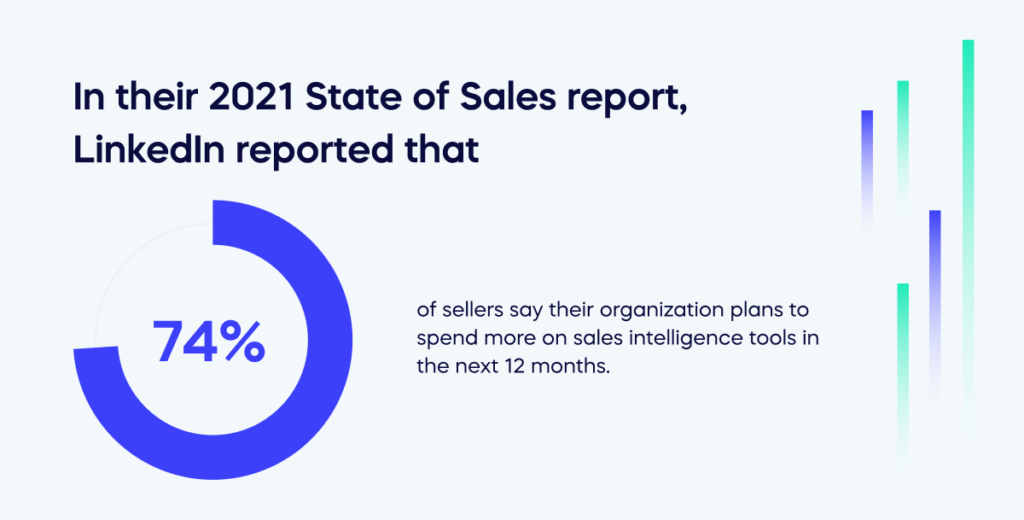
In their 2021 State of Sales report, LinkedIn reported that 74% of sellers say their organization plans to spend more on sales intelligence tools in the next 12 months.
Investing in new tools is a quick and easy way to drive digital transformation.
But if you’re a sales professional, where should you spend your money? What tools are out there? What do they do?
And most importantly, are they worth it?
The best sales tools are truly indispensable to you. But the best approach to procuring sales tools is to buy as few tools as you can to continue to be effective.
In this article, we’ll provide an in-depth look at 34 sales tools that every sales professional should be aware of and provide links to some of the more popular options on the market.
You almost certainly do not need all these tools.
But you almost certainly need some of them.
Peruse our list, and see which sales tools you need to transform your sales operations. And if you decide to invest in any of these tools, make sure you have a robust digital adoption strategy to get maximum value.
Customer relationship management (CRM) systems
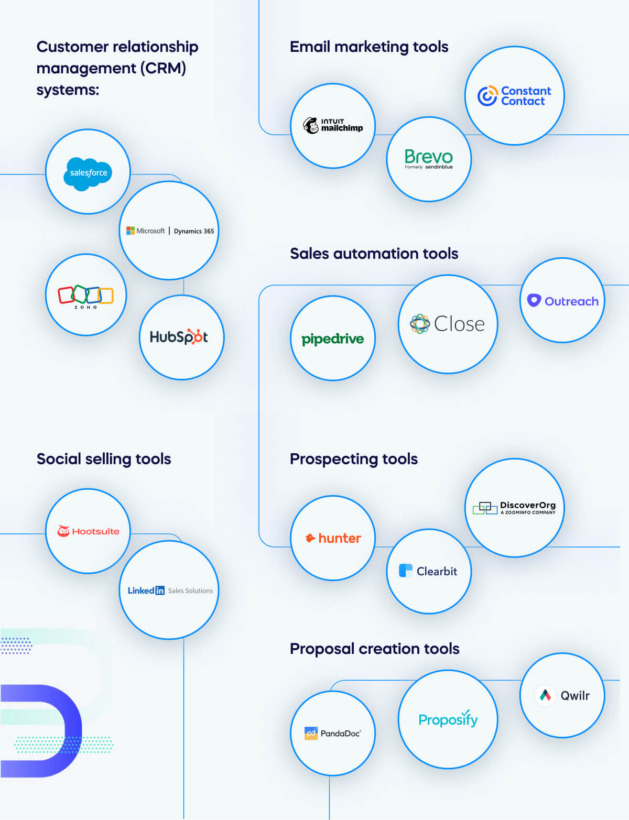
A CRM is a sales tool that helps you manage customer information and increase sales efficiency.
It stores contact information, sales opportunities, conversations, and other sales data in one easily accessible place.
An effective CRM will help your team keep track of upcoming deals, follow up with leads quickly, and create a better customer experience.
Examples of popular CRMs:
Email marketing tools
Email marketing tools are essential for reaching prospective customers and building relationships with current customers.
These platforms help you design attractive emails, segment audiences, automate email campaigns with triggers, track key metrics like open rates and click-throughs, and more.
With the right tool, you can craft emails that will drive more engagement and increase customer satisfaction.
Here are a few popular email marketing tools:
Sales automation tools
Every sales team should have an automation strategy.
Sales automation tools help streamline processes in the sales process.
They can automate mundane tasks such as data entry, scheduling activities, lead qualification and routing, and prospecting.
This helps your team focus their time on building relationships and closing deals instead of monotonous administrative work.
These tools also provide insights into which leads are most likely to become customers.
Here are a few examples of sales automation tools:
Social selling is a strategy of using social media platforms to connect with prospects and build relationships with existing customers.
These tools make it easier for sales professionals to find potential customers by searching through profiles and identifying key contacts at organizations, and target accounts.
Here are a couple of popular social selling tools:
Prospecting tools
Prospecting tools are essential for gathering leads and finding potential customers.
These tools help you create targeted campaigns to reach the right prospects, monitor lead engagement, track activities such as emails sent and calls made, and gain key insights into customer behavior.
With an effective prospecting tool, you can increase productivity by automating manual tasks in the lead generation process.
Here are a few popular prospecting tools:
Proposal creation tools
Proposal creation tools make it easier for sales teams to create professional-looking proposals quickly.
They often have features like template libraries or drag-and-drop elements that allow you to customize your proposals with ease.
You can also use these platforms to collaborate with your team, manage version control, measure the effectiveness of your proposals, and track proposal performance.
Here are a few popular proposal creation tools:
Sales analytics tools
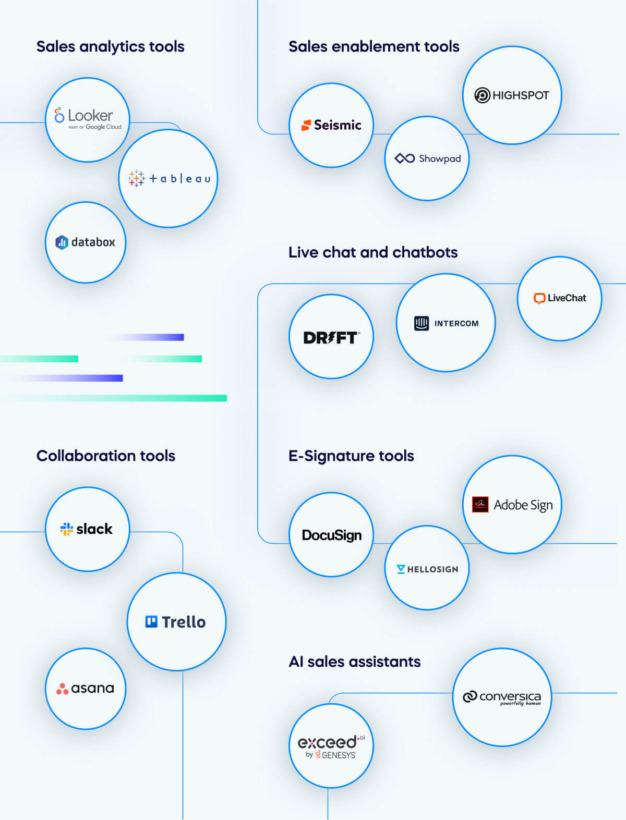
Sales analytics tools provide valuable insights into sales performance.
These tools collect data from across all stages in the sales funnel and visualize it in interactive dashboards.
This makes it easier to spot patterns and trends in customer behavior, uncover areas for improvement, and gain a better understanding of how customers interact with your product or service.
A few of the big names in sales analytics are:
Sales enablement tools
Sales enablement tools help equip sales reps with the skills they need to succeed.
These platforms often include training materials, playbooks, and other resources that can help reps learn the ropes quickly.
Some platforms even offer on-demand coaching capabilities so that reps can get help when they need it.
Here are a few examples of sales enablement tools:
Live chat and chatbots
Live chat and chatbots can help increase customer engagement by providing real-time support to customers.
These tools enable reps to quickly answer questions, provide helpful resources, and guide customers through the buying process.
They also allow reps to track customer activity for a better understanding of customer needs.
Here are a few live chat tools for you to consider:
Collaboration tools
Collaboration tools are essential for sales teams that often work together on projects.
With these tools, you can organize tasks, manage workflow, communicate in real-time, share files easily, and more.
They also make it easy to coordinate with colleagues across different departments or locations so that everyone is on the same page.
There are plenty of collaboration tools out there, but here are a few popular examples:
E-Signature tools
E-signature tools make it easier for sales teams to sign contracts with customers without having to print documents or exchange physical signatures.
These tools provide an electronic signature process that is secure, convenient, and compliant with industry regulations.
Here are a few e-signature tools:
AI sales assistants
AI sales assistants are a form of customer service tool powered by artificial intelligence (AI).
These tools can help automate mundane tasks such as lead qualification and routing, scheduling activities, and more.
They also use natural language processing and machine learning algorithms to generate insights into customer behavior so you can better tailor your approach.
Here are a couple of AI sales assistants on the market right now:
Account-based marketing (ABM) tools
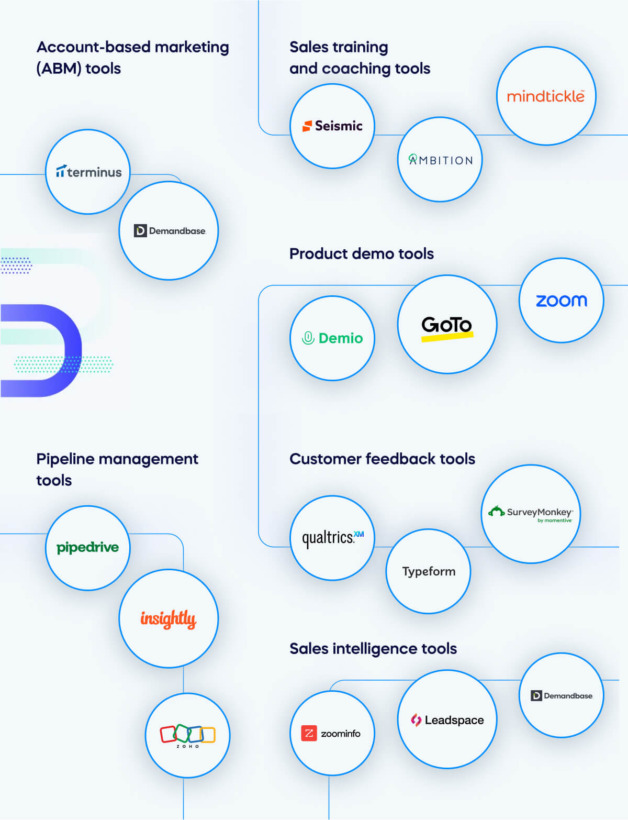
Account-based marketing (ABM) is a strategy used to reach target accounts with personalized messages and content.
ABM tools help you create targeted campaigns, manage customer relationships, measure the effectiveness of campaigns, and more.
These tools make it easier to build relationships at scale so you can better understand customer needs and focus on high-value accounts.
Here are a couple of popular ABM tools:
Sales training and coaching tools
Sales training and coaching tools provide a platform for sales reps to learn new skills or master existing ones.
These platforms often include educational materials such as ebooks, tutorials, webinars, podcasts, online courses, quizzes, etc., that can help reps stay up-to-date with industry trends and sharpen their selling techniques.
Some even offer one-on-one coaching sessions to help reps better understand customer needs and adapt accordingly.
Here are a few examples of sales training and coaching tools:
Product demo tools
Product demo tools make it easier for sales reps to demonstrate products or services in a virtual environment.
These tools allow reps to show off product features, simulate real-world scenarios, and provide interactive demos that customers can participate in.
They also eliminate the need for expensive hardware setups so you can keep costs low while still providing an engaging experience.
If you need a product demo tool, consider:
Pipeline management tools
Pipeline management tools automate the process of tracking leads through the sales cycle.
These tools provide insights into how your prospects are responding to your marketing efforts, where they’re dropping off, what actions need to be taken next, and more.
This enables sales reps to better plan their activities and ensure they’re staying on top of customer needs.
Here are a few popular pipeline management tools:
Customer feedback tools
Customer feedback tools allow sales teams to collect customer feedback and use it to improve the customer experience.
These tools provide a platform for customers to rate their experiences, provide suggestions, or voice any concerns they may have.
This can help you identify areas where you need to make adjustments and foster more positive interactions with your customers.
Here are a few customer feedback tools you may want to consider:
Sales intelligence tools
Sales intelligence tools are designed to give sales representatives access to up-to-date market insights and data that can help them close deals faster.
These tools use predictive analytics and AI algorithms to uncover potential opportunities in target accounts, track competitors’ strategies, and identify areas where you can improve your own sales process.
By leveraging this data, you can develop a more effective approach to sales.
Here are a few sales intelligence tools on the market:
CPQ (Configure Price Quote) tools
CPQ tools provide automated pricing solutions for businesses.
These tools help reduce manual order processing time by providing accurate pricing calculations and product configurations for customers in real time.
This makes it easier to respond quickly to customer inquiries and streamline the ordering process, helping you close deals faster.
Plus, CPQ tools allow you to apply discounts and promotions based on customer preferences or other criteria so that they get the best value for their money.
Here are a few of the bigger names in CPQ tools:
Call and meeting tools
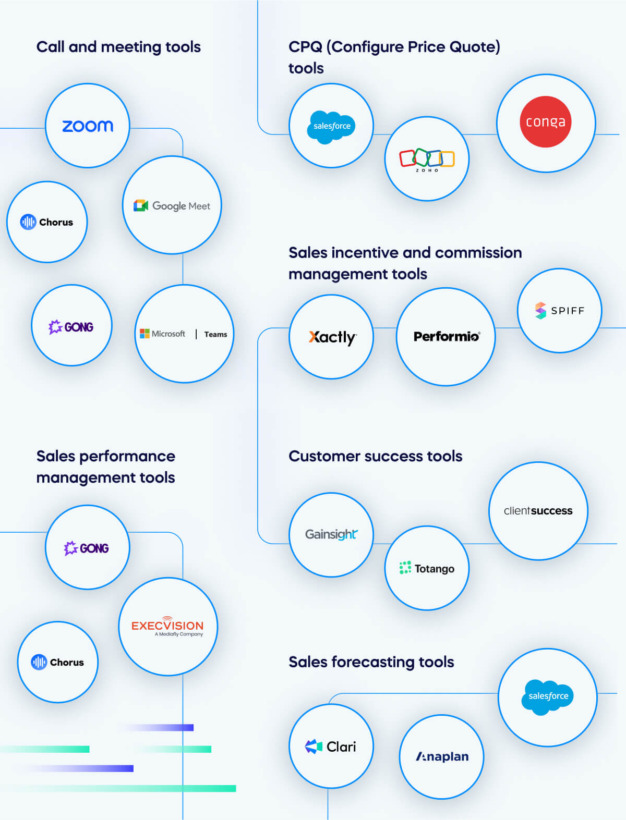
Call and meeting tools make it easier to connect with customers in real time.
These tools allow you to create virtual rooms for video calls, webinars, or online meetings and provide features such as screen sharing, file sharing, recordings, and more.
Plus, many of these tools come with integrated AI capabilities that can help you better understand customer needs and tailor your approach accordingly.
Here are a few of the most popular call and meeting tools:
Sales incentive and commission management tools
Sales incentive and commission management tools help sales reps stay motivated while tracking their progress toward commissions.
These tools automate the process of setting up incentives, calculating commissions, tracking performance metrics, etc., so you can ensure that reps are being compensated fairly for their efforts.
Plus, they help you plan for future incentives and commissions based on historical data, allowing you to adjust your strategy as needed.
Here are a few sales incentive and commission management tools:
Sales performance management tools
Sales performance management tools enable sales teams to monitor and improve their performance over time.
These tools provide analytics that measure key metrics such as customer lifetime value, average deal size, conversion rates, lead response times, etc. so that reps can identify areas for improvement.
Plus, these tools can also be used to track progress against goals and develop actionable insights that can help reps stay on top of their game.
Here are a few sales performance management tools to explore:
Customer success tools
Customer success tools help sales teams keep customers engaged with the product or service.
These tools enable reps to monitor customer usage, identify areas where customers may need help, and provide personalized support when needed.
Plus, these tools can be used to track customer feedback and measure success over time so that reps can adjust their approach accordingly.
A few popular customer success tools include:
Sales forecasting tools
Sales forecasting tools make it easier to predict future revenue and plan for upcoming opportunities.
These tools use data from past sales cycles, market trends, customer interactions, etc., to create accurate forecasts based on current conditions.
This helps reps prepare for changing market dynamics and take advantage of new business opportunities as they arise.
Here are a few sales forecasting tools:
Appointment scheduling tools
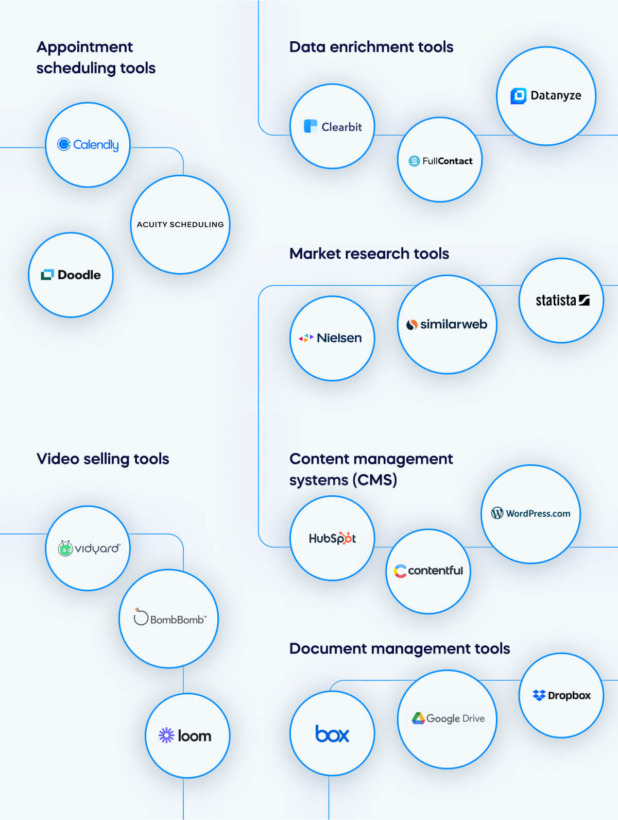
Appointment scheduling tools enable sales teams to quickly coordinate meetings with potential customers or existing clients.
These tools allow you to schedule appointments directly from your calendar or through automated booking systems, so that reps can quickly and easily manage their time.
Plus, they help reps save time by automatically sending reminders to customers about upcoming appointments or changes in schedule.
Here are a few appointment scheduling tools:
Data enrichment tools
Data enrichment tools help sales teams gain deeper insights into customer behavior and preferences.
These tools collect data from multiple sources such as social media, emails, online surveys, etc., to provide a more comprehensive picture of the customer journey.
This helps reps craft more effective strategies for targeting prospects and engaging existing customers.
Some of the data enrichment tools you could consider are:
Market research tools
Market research tools enable sales teams to stay up-to-date on industry trends and competitor activities.
These tools allow you to track news articles, financial statements, product launches, customer feedback, etc. so that reps can gain valuable insights into the market.
Plus, these tools can help reps identify opportunities to increase sales and maintain a competitive edge.
If you’re in the market for market research tools, start here:
Video selling tools
Video selling tools provide an engaging way for sales teams to interact with prospects and existing customers.
These tools allow you to create personalized video messages or live presentations for clients so that reps can quickly establish a connection and catch their attention.
Plus, they provide features such as analytics tracking, customized branding, interactive calls-to-action, etc., which help reps tailor their approach based on customer preferences.
Here are a few video selling tools to think about:
Content management systems (CMS)
Content management systems (CMS) enable sales teams to easily manage website content across multiple devices and platforms.
CMS platforms provide features such as drag-and-drop interfaces, page customization, and automated content updates, so that reps can quickly create dynamic web pages and optimize the customer experience.
Plus, these tools help reps increase website traffic by providing SEO optimization tools and analytics tracking capabilities.
Some of the biggest CMS tools that you may already be aware of include:
Document management tools
Document management tools enable sales teams to easily store, organize, and share documents with prospects or existing customers.
These tools allow you to securely upload files to a cloud-based storage system, so that reps can access documents from multiple devices at any time.
Plus, they help reps save time by enabling them to search for specific documents within the system using keywords or tags.
Here are few of the biggest names in document management:
Product information management (PIM) tools
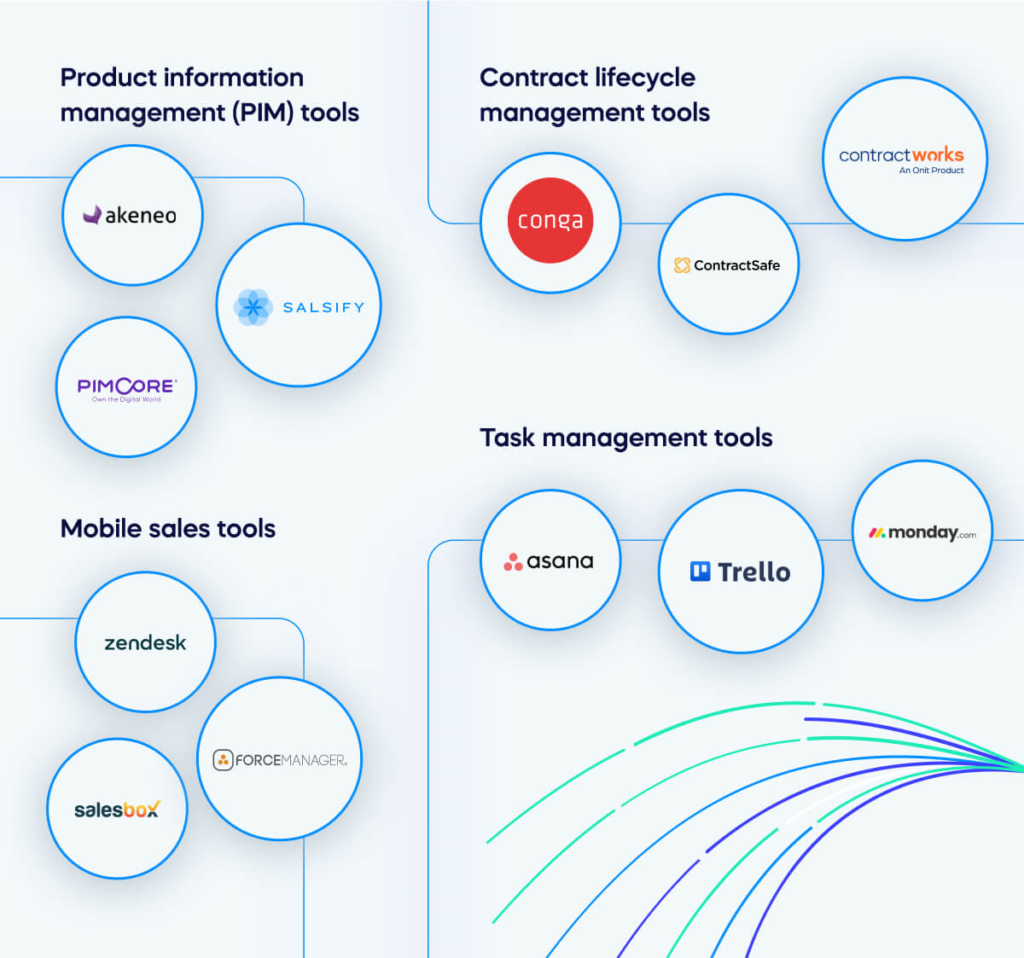
Product information management (PIM) tools help sales teams manage product information across multiple channels.
These tools provide features such as automated data collection, data integration, and product catalogs so that reps can quickly access the most up-to-date information about products and services.
Plus, they enable reps to create customized product descriptions for different markets or areas of interest.
If you’re looking for a PIM tool, consider these:
Contract lifecycle management tools
Contract lifecycle management tools provide an easy way for sales teams to manage contracts throughout their entire lifecycle.
These tools allow you to track contract versions, monitor changes between iterations, and generate reports in real time so that reps can remain compliant with regulations.
Plus, they help reps save time by automating approval processes and providing reminders about upcoming deadlines.
Here are a few contract lifecycle management tools to think about:
Task management tools
Task management tools enable sales teams to easily set and track goals, tasks, and deadlines.
These tools provide features such as project tracking, task delegation, and collaboration tools so that reps can quickly manage their workloads.
Plus, they help reps stay organized by providing reminders about upcoming tasks or changes in schedule.
Here are some of the most popular task management tools out there:
Mobile sales tools
Mobile sales tools provide an easy way for reps to access customer information while on the go.
These tools allow you to store customer data securely on your device, so that reps can quickly access contact details or order history when visiting customers.
Plus, they help reps save time by automating common processes such as lead generation or payment processing.
Here are a few mobile sales tools for you to explore:
The one tool you definitely need: A digital adoption platform
Whichever tools you choose to use to enhance your tech stack, you must factor in the cost (both time and money) of implementing those tools.
Your employees will need to be trained to reduce the time-to-value of any new tools, and to be able to continue to do their jobs effectively.
That’s where a digital adoption platform (DAP) becomes an essential part of your tech stack.
Whether you want to invest in sales tools to set up new functions or to digitize existing processes, a DAP can help you hit the ground running with new sales tools.


